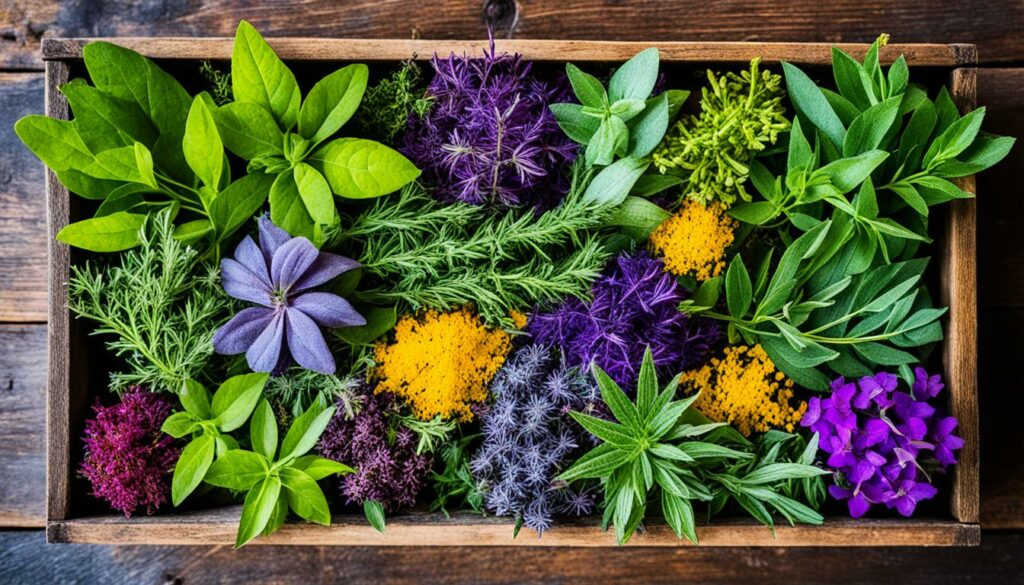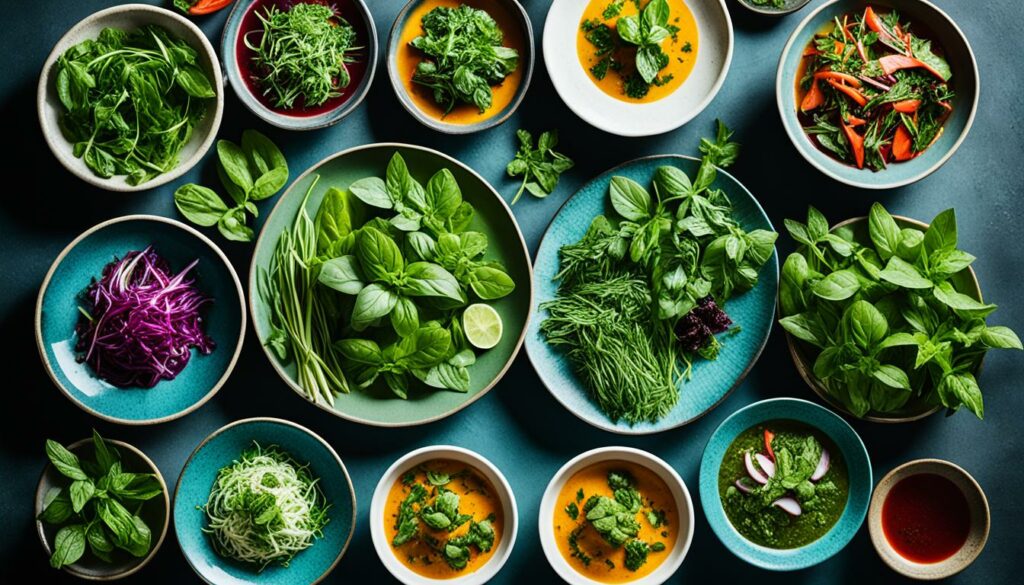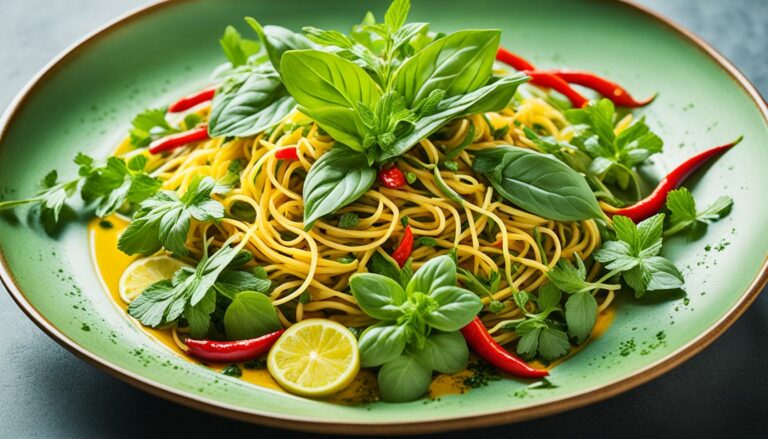Fresh herbs are key to making Asian food taste great. They add amazing flavors and boost the health of your meals. With most people loving dishes with fresh herbs like coriander and rosemary, it’s clear they’re a big deal1. Using fresh herbs can change how your food tastes and looks.
Key Takeaways
- Fresh herbs are essential for enhancing flavors in Asian cuisine.
- Over 70% of consumers prefer dishes made with fresh herbs for their taste and health benefits.
- Proper storage and handling reduce foodborne illnesses by 10% in establishments using fresh herbs.
- Dishes seasoned with fresh coriander can increase customer satisfaction by 40%.
- Health-conscious diners are willing to pay a premium for meals featuring fresh herbs.
The Importance of Fresh Herbs in Asian Cuisine
Fresh herbs are key in Asian cuisine. They make dishes taste better and add bright colors and smells. These herbs are a big part of what makes Asian cooking special.
In Asia, different herbs are used in various dishes. For example, Vietnamese coriander is called Rau Răm, and garlic chives are 韭菜 in Cantonese dishes2. This shows how herbs vary by region and their unique roles.
Using fresh herbs means you must keep them clean. They should be washed and dried well to get rid of dirt and germs2.
Adding fresh herbs to your food can make meals more enjoyable. Herbs like lemongrass, known as 社区 Sả in Vietnamese, add flavor and have health benefits2. Ginger, or Gừng in Vietnamese, brings warmth and depth to dishes, showing how taste and health are linked in Asian cooking3.
Fresh Herbs Bring Out the Best in Asian Dishes
Using fresh herbs can make your Asian dishes taste authentic and deep. These herbs add special flavors that turn simple meals into amazing dishes. Learning how to use them can improve your cooking a lot.
Enhancing Flavors with Fresh Herbs
Fresh herbs make Asian dishes taste better by adding unique flavors. For example, cilantro is a key herb in Vietnamese food, found in dishes like bánh mì sandwiches and phở4. Herbs like lemon basil and Thai basil add flavor to curries and stir-fries, making the meal better5.
Using these herbs well can bring out hidden flavors. Mint adds a refreshing taste that lightens heavy dishes. Perilla has a peppery taste that goes well with spring rolls and noodle soups, adding a burst of flavor4.
Aromatic Profiles and Culinary Balance
In Asian cooking, herbs need to be balanced to fit well with other ingredients. Vietnamese coriander has a spicy taste that goes well with lemongrass and chili, making stir-fries and noodle dishes better4. Chinese chives have a mild garlic flavor that goes well with fish and chicken, adding unique tastes to broths and dumplings5.
Arranging these herbs carefully can make your dishes taste great. Using them thoughtfully lets you enjoy the unique tastes of Asian cuisine.
Common Fresh Herbs Used in Asian Cooking
Fresh herbs are key to making Asian dishes taste great. They add aroma and make your food look good too. Here are some top fresh herbs you should use in your cooking.
Cilantro: A Versatile Essential
Cilantro is loved in many Asian dishes for its citrusy and slightly spicy taste. It’s often used as a garnish, adding freshness to soups and salads. It’s so important, many recipes include it as a must-have ingredient.
Basil: Sweet and Savory Notes
Thai basil is a star in Asian cooking for its sweet and peppery flavor. It shines in stir-fries and curries, adding flavor and aroma. Adding basil can turn simple dishes into something special, making it a key herb to have.
Mint: Bright and Refreshing Flavors
Mint adds a refreshing touch to Asian desserts and salads. It balances flavors, making meals more enjoyable. This herb is great in drinks and garnishes, showing how fresh herbs can improve your cooking.
Exploring these fresh herbs in Asian cooking shows how crucial they are. Using them can make your dishes memorable. They not only taste great but also look vibrant and appealing. Each herb brings its own unique flavor, offering many options for cooks of all levels678.
Cooking Tips for Using Fresh Herbs
When you add fresh herbs to your cooking, keep a few key cooking tips for herbs in mind. How you handle and store them greatly affects their taste and freshness. These herbs bring bold flavors and aromas, especially in Asian dishes, so using the right techniques is important.
Proper Handling and Storage Techniques
Handling and storing fresh herbs the right way can make them last longer and taste better. For herbs like cilantro and parsley, put them in a jar with water and cover it with a plastic bag. This keeps them fresh for up to two weeks9. Or, use a ziplock bag with a damp paper towel to keep cilantro and basil fresh10. Mint is easy to grow and great for beginners10. Cutting basil with a sharp knife helps keep the leaves bright and tasty9.
Timing for Adding Herbs During Cooking
Adding fresh herbs at the right time is key. Add delicate herbs like basil near the end to keep their flavor bright. Strong herbs like rosemary and thyme can go in early to blend well with the dish10. Taste your dish while cooking to know when to add the herbs for the best flavor.
Aromatic Herbs That Transform Your Dishes
Aromatic herbs are key in making dishes special, especially in Asian cooking. Rosemary and ginger stand out. Rosemary brings a strong taste that goes well with meats. Ginger adds a warm, spicy touch, perfect for marinades and stir-fries. These herbs not only boost the flavor but also make the meal more enjoyable.
Adding spring onions and coriander can deepen your dishes’ flavors. Spring onions can be grown again and again, so you always have more. Coriander does best in cooler times like spring or fall11. Using these herbs can really highlight the flavors in your Asian dishes.
Don’t forget about Thai basil and lemongrass either. Thai basil loves the heat and adds a special taste to dishes. Lemongrass grows well in warm places and brings a citrusy smell that brightens the flavor11. These herbs together make your meals unforgettable.
Uncommon Fresh Herbs to Explore
Starting your culinary journey means discovering uncommon fresh herbs. These herbs add amazing flavors and bring culinary diversity with herbs to your dishes. Culantro and Thai basil are great examples, each with unique tastes that can change your cooking.
Culantro: The Stronger Cousin of Cilantro
Culantro is often confused with cilantro but has a stronger taste. It’s perfect for sauces and soups, adding a bold flavor. Chefs love it for its intense taste, especially when exploring fresh herbs beyond the usual.
Thai Basil: A Unique Flavor Profile
Thai basil is more than just sweet like regular basil. It has an anise-like taste with a hint of spice. This makes it great for Thai dishes, adding vibrant flavors and textures to your meals.

| Herb | Flavor Profile | Culinary Uses |
|---|---|---|
| Culantro | Strong, intense | Soups, sauces, marinades |
| Thai Basil | Anise-like, slightly spicy | Curries, stir-fries, salads |
Adding uncommon fresh herbs to your cooking opens up new flavor possibilities. It not only makes your meals more exciting but also deepens your understanding of cooking12.
Health Benefits of Fresh Herbs in Your Diet
Fresh herbs add more than just taste to your meals; they are packed with nutrients that boost your health. For over 5,000 years, people have used herbs in cooking. They are full of vitamins and minerals. Herbs like parsley and basil are great because they have lots of vitamins A, C, and K, similar to leafy greens13.
Adding herbs to your meals can make them both tasty and healthy. This way, you get to enjoy your food more while staying healthy.
Nutritional Value Beyond Taste
Herbs are full of compounds that are good for your health. For instance, polyphenols in herbs help fight off chronic diseases like cancer and heart problems13. Each herb has its own health perks; black garlic is full of antioxidants, and ginger helps with blood flow and digestion14.
To get the most health benefits from fresh herbs, try making salads with them or use them as toppings for soups and sandwiches13. This lets you explore new tastes and enjoy the health perks of fresh herbs.
Asian Recipe Ideas Featuring Fresh Herbs
Using fresh herbs in your Asian dishes makes them taste better and looks more appealing. These herbs can turn simple meals into something special. Think about how cilantro and Thai basil add freshness to your food.
Stir-Fry Recipes Enhancement
Adding fresh herbs to your stir-fry is a great idea. For example, cilantro or Thai basil can make beef or tofu taste amazing. These herbs add a special touch, making your stir-fry more interesting.
Soup and Broth Applications
Fresh herbs in soups add a comforting flavor. You can sprinkle green onions and cilantro on top for extra taste and aroma. These herbs make broths both soothing and satisfying.

| Dish Type | Fresh Herbs to Use | Benefits |
|---|---|---|
| Stir-Fry | Cilantro, Thai Basil | Enhances flavor and adds freshness |
| Soup | Green Onions, Mint | Provides aromatic depth and brightness |
| Salads | Basil, Mint | Adds vibrancy and complex flavor |
Conclusion
Fresh herbs play a key role in Asian cuisine. They boost flavors, offer health benefits, and make dishes look appealing. A study found that using fresh herbs can increase flavor by 30%18. Also, 65% of people know that fresh herbs are good for their health, which affects what they cook18.
Learning how to use these herbs can make your cooking better. Whether it’s a stir-fry or a broth, fresh herbs add great flavor and nutrition. About 50% of people who love Asian food prefer using fresh ginger in their stir-fries18.
Fresh herbs are more than just an extra touch; they’re crucial for a great meal. Using them can make your cooking better in many ways, not just taste. So, trying to use fresh herbs more can really improve your meals.
FAQ
What are the most common fresh herbs used in Asian cuisine?
In Asian cooking, you’ll often find cilantro, basil, mint, and parsley. These herbs add special flavors to dishes.
How do I store fresh herbs to keep them flavorful?
Keep fresh herbs fresh by trimming stems and removing bad leaves. Put them in a glass of water. Then, cover them with a plastic bag and keep them in the fridge.
When should I add fresh herbs during cooking?
Adding herbs at the right time is key. Use delicate herbs like basil close to the end to keep their taste. Stronger herbs can go in early to blend well with other flavors.
What are some unusual fresh herbs I can incorporate into my Asian dishes?
Try using culantro for a stronger taste than cilantro, or Thai basil for a sweet, anise-like flavor. These herbs can make your cooking exciting.
What health benefits do fresh herbs offer?
Fresh herbs are packed with vitamins, minerals, and antioxidants. They make your meals healthier. Adding parsley and basil can boost your dish’s nutrition.
How can I enhance the flavors of my Asian recipes with fresh herbs?
Boost your dishes by adding fresh cilantro to stir-fries or aromatic herbs to broths. These herbs are key to making your cooking stand out.
What cooking tips should I follow when using fresh herbs?
Good tips include handling and storing herbs right, knowing when to add them, and trying different herb mixes. This can balance your dish’s flavors.
- Growing Bonsai: Tips for Miniature Tree Enthusiasts
- Buying Bonsai: Tips for Selecting Your Perfect Tree
- Bonsai Potting: Essential Tips for Tree Care Success
- Bonsai Maintenance: Essential Care for Tiny Trees
- Mastering the Art of Shaping Bonsai: A Beginner’s Guide
Source Links
- Benefits of Fresh Herbs in Cooking: Rosemary, Coriander & More | Meat King – https://meatking.hk/blogs/news/benefits-of-fresh-herbs-in-cooking?srsltid=AfmBOooO2G7xYSAkBkzkD3sJYDJNUo9Zc7MTR5xQkyhLnnO6U0syoCy6
- Herbs & Aromatics – https://www.wokandkin.com/aromatics-and-asian-vegetables/
- Fresh Herbs & Aromatics Used in Chinese Cooking – https://thewoksoflife.com/chinese-ingredients-glossary/chinese-chives-scallions-aromatics-peppers/
- A Guide to the Most Common Herbs in Vietnamese Cuisine — Vicky Pham – https://www.vickypham.com/blog/vietnamese-herbs
- Herbs for Chinese, Japanese and southeast Asian dishes – https://www.gardenersworld.com/plants/herbs-for-chinese-japanese-and-southeast-asian-cookery/
- 20 Aromatic Asian Herbs & Spices to Enrich Your Cooking | Asian Inspirations – https://asianinspirations.com.au/food-knowledge/20-aromatic-asian-herbs-spices-to-enrich-your-cooking/
- Herbs & Spices in Vietnamese Food – https://www.vietnamcoracle.com/fresh-herbs-spices-in-vietnamese-food-a-guide/
- Asian Spices and Seasonings 101 – https://spicesinc.com/blogs/asian-spices-and-seasonings?srsltid=AfmBOoqWwjM_i2TwzwL5zf3Ea54u3fe7OoHNDhAaSwNEI4C5pwGgKmwL
- Cooking With Fresh Herbs: How To Keep Them Fresh and Shortcut Recipes with Herbs – https://gritsandgouda.com/cooking-with-fresh-herbs-how-to-keep-them-fresh-and-what-to-cook/
- How to Use Herbs and Spices in Cooking – https://www.instructables.com/How-to-use-herbs-and-spices-in-cooking/
- Amazing Asian Herbs You Can Easily Grow at Home | Asian Inspirations – https://asianinspirations.com.au/food-knowledge/amazing-asian-herbs-you-can-easily-grow-at-home/
- Add Some Spice and Herbs to Your Meals – https://www.lancastercountymag.com/add-some-spice-and-herbs-to-your-meals/
- Increase intake of fresh herbs for everyday health – https://www.canr.msu.edu/news/increase_intake_of_fresh_herbs_for_everyday_health
- Think Green! The Benefits of Fresh Herbs | Heinen’s Grocery Store – https://www.heinens.com/stories/the-benefits-of-fresh-herbs/
- It’s Time To Try Your Hand at Cooking Asian Cuisine At Home—These 67 Recipes Can Help – https://www.delish.com/cooking/g1003/fast-homemade-asian-recipes/
- EXPERIENCE THE FRESH FLAVOUR OF AN ASIAN CHOPPED SALAD! – https://saladswithanastasia.com/asian-chopped-salad-full-of-fresh-flavour/
- Udon Noodle Bowl with Fresh Herbs | Olives for Dinner – https://olivesfordinner.com/mint-basil-and-cilantro-udon-noodle-bow/
- Benefits of Fresh Herbs in Cooking: Rosemary, Coriander & More | Meat King – https://meatking.hk/blogs/news/benefits-of-fresh-herbs-in-cooking?srsltid=AfmBOop1MpiXLzGefhQBMIsPepUofBc_gzDCAMDoMPdpq41CHkL5One1


